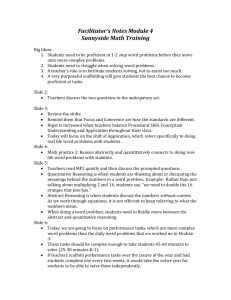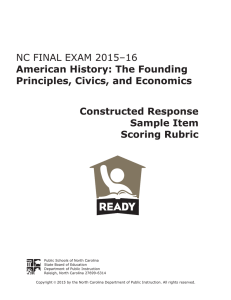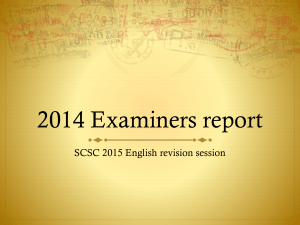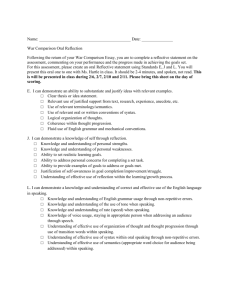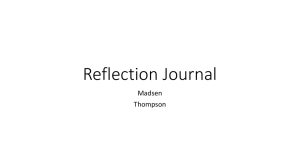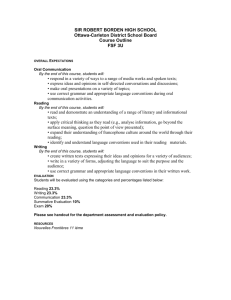Improving Freshmen Reflective Writing through Rubric-Based Feedback LAURA E. MARTIN, PHD, UC MERCED
advertisement
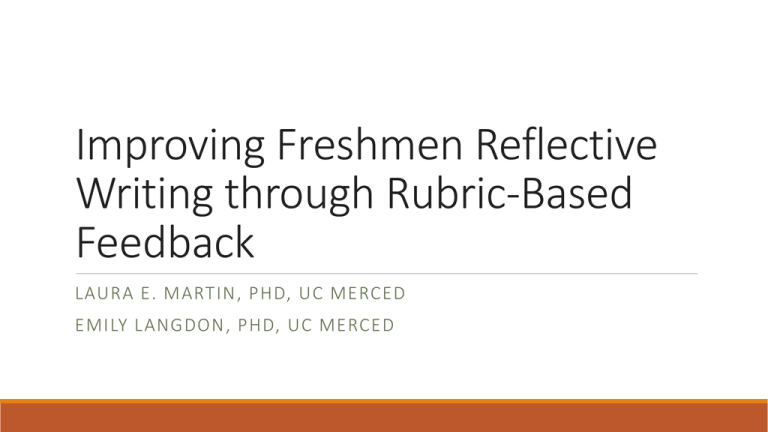
Improving Freshmen Reflective Writing through Rubric-Based Feedback LAURA E. MARTIN, PHD, UC MERCED EMILY LANGDON, PHD, UC MERCED Outcomes Familiar with 1. How the course is designed to support development of intended writing outcome. 2. What direct and indirect evidence of student learning revealed about the student learning and our pedagogy, including targets for revision to instruction USTU 10: Introduction to Undergraduate Studies Course Goals: Through this 1 unit class, freshmen develop 1. Self Management and Personal Responsibility 2. Learning Effectiveness and Study Skills 3. Self-Motivation and Self-Esteem USTU 10 Reflective Journal Learning Outcome: Generate college level, written reflective work that • illustrates intentional engagement with the prompt, • makes insightful observations relating your experiences to course concepts, and • uses convincing examples effectively . Pedagogy Weekly: 1. Students wrote a 500 word reflection in response to a highly structured prompt. Prompt engaged them in reading; was preparatory for class. 2. Receive feedback based on a scoring rubric. 3. If scored a zero on any rubric criterion, had to revise and resubmit the assignment. Most common reason for revision: Not addressing the entire prompt (i.e. failing to “answer the question” ) Example Prompt (from On Course textbook) In this activity, you will practice identifying positive methods for reducing the stress in your life. 1. Write about a recent time when you experienced being overwhelmed, angry or resentful, sad or depressed, afraid or anxious. Fully describe the situation that caused your emotional response; then describe the feelings you experienced; finally, explain what you did (if anything) to manage your emotions in a positive way. 2. Identify three or more strategies that you could use in the future when you experience this emotion. Explain each strategy in a separate paragraph. When you’re done, notice if simply writing about your stressors and ways to manage them may have reduced your level of stress. Skills Depth of reflection Score: Use of textual evidence Score: Language use Score: Writing conventions Score: Highly Proficient (3) Demonstrates conscious and thorough understanding of the writing prompt and the subject matter. This reflection can be used as an example for other students. Uses specific and convincing examples from the texts studied or your life to support claims in own writing; makes insightful and relevant connections between texts and/or own life experiences. Proficient (2) Nearly Proficient (1) Unacceptable (0) Demonstrates thoughtful understanding of the writing prompt and the subject matter. Demonstrates a basic understanding of the writing prompt and the subject matter. Demonstrates little or no understanding of the writing prompt and the subject matter. This reflection needs revision. Uses relevant examples from the texts studied or your life to support claims in your own writing; makes relevant connections between texts and/or own life experiences. Uses general or vague examples from the text studied or your life to support some claims in your writing with some connections made between texts, and/or own life experiences. Uses unconvincing, poorly specified examples or does not include examples at all; not able to support claims with connections between texts and/or own life experiences. Uses stylistically sophisticated language that is precise and engaging, with notable sense of voice, awareness of audience and purpose, and varied sentence structure. Uses basic but appropriate Uses language that is fluent, language, with a basic sense of with evident a sense of voice, voice, some awareness of awareness of audience and audience and purpose and purpose, and the ability to some attempt to vary sentence vary sentence structure. structure. Demonstrates control of academic writing conventions with essentially no errors, even with sophisticated language. Demonstrates control of academic writing conventions, exhibiting occasional errors only when using sophisticated language. Comments Uses language that is either unsuitable and/or imprecise for the audience or purpose, with little or no sense of voice, and a limited awareness of how to vary sentence structure. Demonstrate little or no Demonstrates partial control of control of academic writing academic writing conventions, conventions, exhibiting exhibiting occasional errors that frequent errors that make do not hinder comprehension. comprehension difficult. Adapted from NCTE, 2006 Pedagogy Consistent with Researchbased understanding of learning Practice with feedback is essential for learning. “Helpful feedback is one of the strongest influences on achievement.” (Eli Review, 2015) As per the Eli Review, the most effective feedback: 1. Is formative — it helps learners get better at a task or increases their understanding. 2. Is timely — it happens at a moment when it's possible to learn and change (e.g., revise). 3. Is descriptive, goal referenced and directed. Eli Review http://elireview.com/content/td/feedback/ Hattie & Timperley. 2007. The Power of Feedback. Review of Educational Research 77: 81-112. Pedagogy Consistent with Researchbased understanding of learning Through feedback, learners should understand 1. What they accomplished (descriptive). 2. What they were asked to accomplish (goal referenced). 3. What they must do next (goal directed). - Eli Review, 2015 Eli Review http://elireview.com/content/td/feedback/ Hattie & Timperley. 2007. The Power of Feedback. Review of Educational Research 77: 81-112. Assessment as Pedagogy 1. Outcome: Write a reflective essay 2. Evidence: Reflective essays 3. Design: • Weekly reflective writing assignments. • Weekly feedback using rubric. • If score a 0 on any rubric category, must revise and resubmit. 4.-6. Gather evidence, draw conclusions, act on results: • Periodically through semester, share with class common strengths and skills to strengthen. • Provide good examples of essays by current students to class (with permission). • Continue to provide individual feedback, pushing to strengthen. 6. As necessary, act on the results to improve student achievement of learning goals 1. Establish goals for student learning (expressed as learning outcomes) 2. Determine the evidence: the work students will do to demonstrate their learning 5. Draw conclusions about student learning achievements in the aggregate 4. Gather & review evidence of student learning 3. Design & provide intentional learning experiences (curriculum & pedagogy) So what happened? (Direct) Evidence of Learning DIRECT EVIDENCE: Median Assignment Score at Start and End of the Semester (with min, max and range, n=26) 4 = Nearly Proficient 4.5 Start 8.25 End 0 2 4 6 8 8 = Proficient 10 Median Score for Assignment (out of 12 possible points) 12 DIRECT EVIDENCE: By rubric criterion, % of papers proficient or better. Within each pair, upper bar is the start, and lower bar is the end, of the semester. (n=25) 12% Reflection 68% 8% Evidence 92% 4% Language 68% 8% Conventions 44% 0% 20% 40% 60% 80% PERCENTAGE OF PAPERS PROFICIENT OR BETTER (SCORE 2 OR GREATER) 100% (Indirect) Evidence of Learning Final Essay Prompt Students review all past writing assignments to identify progression in their learning. Write a paper reflecting on How s/he has changed, What s/he still want to work on, and Point out the parts of the book that have had the most meaning to her/him. Give specific examples whenever possible of your own successes and changes. Themes from Final Writing Assignment 1. Marked Improvement 2. Skills and Attitudes Gained 3. Impact on Other Courses 4. Role of Feedback, Revision and Practice Complementarity in USTU 10 Together direct and indirect evidence • illustrate the efficacy of our pedagogy. • identify areas for instructional attention in future offerings. Direct Evidence: Weekly essays Indirect evidence: Final reflection Indirect evidence: 12 opportunities to practice with feedback over the semester
